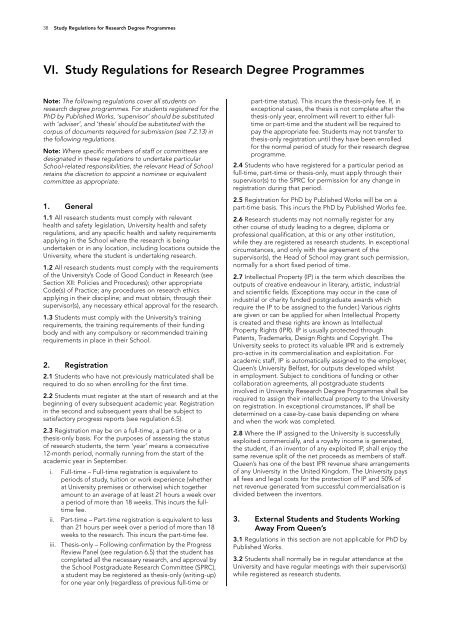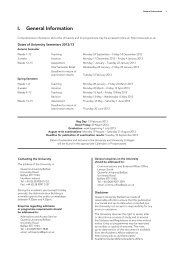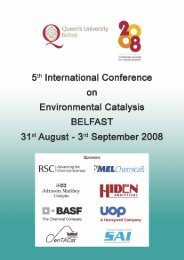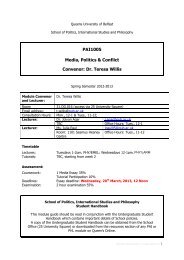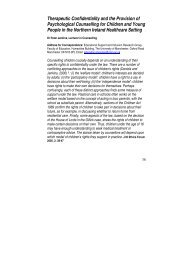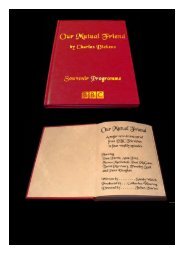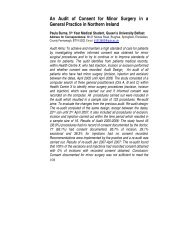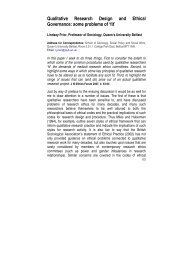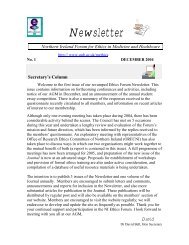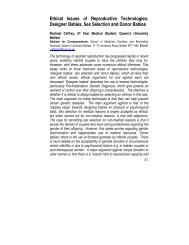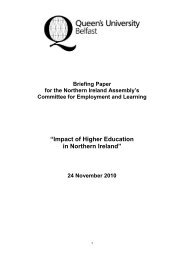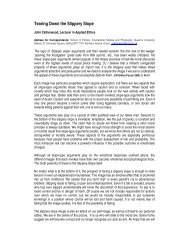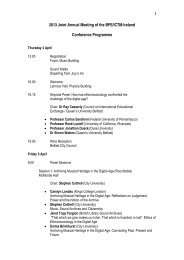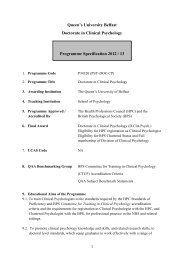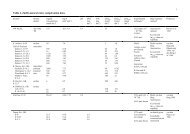University Calendar for Postgraduate Students 2012/13 - Queen's ...
University Calendar for Postgraduate Students 2012/13 - Queen's ...
University Calendar for Postgraduate Students 2012/13 - Queen's ...
Create successful ePaper yourself
Turn your PDF publications into a flip-book with our unique Google optimized e-Paper software.
38 Study Regulations <strong>for</strong> Research Degree Programmes<br />
VI. Study Regulations <strong>for</strong> Research Degree Programmes<br />
Note: The following regulations cover all students on<br />
research degree programmes. For students registered <strong>for</strong> the<br />
PhD by Published Works, ‘supervisor’ should be substituted<br />
with ‘adviser’, and ‘thesis’ should be substituted with the<br />
corpus of documents required <strong>for</strong> submission (see 7.2.<strong>13</strong>) in<br />
the following regulations.<br />
Note: Where specific members of staff or committees are<br />
designated in these regulations to undertake particular<br />
School-related responsibilities, the relevant Head of School<br />
retains the discretion to appoint a nominee or equivalent<br />
committee as appropriate.<br />
1. General<br />
1.1 All research students must comply with relevant<br />
health and safety legislation, <strong>University</strong> health and safety<br />
regulations, and any specific health and safety requirements<br />
applying in the School where the research is being<br />
undertaken or in any location, including locations outside the<br />
<strong>University</strong>, where the student is undertaking research.<br />
1.2 All research students must comply with the requirements<br />
of the <strong>University</strong>’s Code of Good Conduct in Research (see<br />
Section XII: Policies and Procedures); other appropriate<br />
Code(s) of Practice; any procedures on research ethics<br />
applying in their discipline; and must obtain, through their<br />
supervisor(s), any necessary ethical approval <strong>for</strong> the research.<br />
1.3 <strong>Students</strong> must comply with the <strong>University</strong>’s training<br />
requirements, the training requirements of their funding<br />
body and with any compulsory or recommended training<br />
requirements in place in their School.<br />
2. Registration<br />
2.1 <strong>Students</strong> who have not previously matriculated shall be<br />
required to do so when enrolling <strong>for</strong> the first time.<br />
2.2 <strong>Students</strong> must register at the start of research and at the<br />
beginning of every subsequent academic year. Registration<br />
in the second and subsequent years shall be subject to<br />
satisfactory progress reports (see regulation 6.5).<br />
2.3 Registration may be on a full-time, a part-time or a<br />
thesis-only basis. For the purposes of assessing the status<br />
of research students, the term ‘year’ means a consecutive<br />
12-month period, normally running from the start of the<br />
academic year in September.<br />
i. Full-time – Full-time registration is equivalent to<br />
periods of study, tuition or work experience (whether<br />
at <strong>University</strong> premises or otherwise) which together<br />
amount to an average of at least 21 hours a week over<br />
a period of more than 18 weeks. This incurs the fulltime<br />
fee.<br />
ii. Part-time – Part-time registration is equivalent to less<br />
than 21 hours per week over a period of more than 18<br />
weeks to the research. This incurs the part-time fee.<br />
iii. Thesis-only – Following confirmation by the Progress<br />
Review Panel (see regulation 6.5) that the student has<br />
completed all the necessary research, and approval by<br />
the School <strong>Postgraduate</strong> Research Committee (SPRC),<br />
a student may be registered as thesis-only (writing-up)<br />
<strong>for</strong> one year only (regardless of previous full-time or<br />
part-time status). This incurs the thesis-only fee. If, in<br />
exceptional cases, the thesis is not complete after the<br />
thesis-only year, enrolment will revert to either fulltime<br />
or part-time and the student will be required to<br />
pay the appropriate fee. <strong>Students</strong> may not transfer to<br />
thesis-only registration until they have been enrolled<br />
<strong>for</strong> the normal period of study <strong>for</strong> their research degree<br />
programme.<br />
2.4 <strong>Students</strong> who have registered <strong>for</strong> a particular period as<br />
full-time, part-time or thesis-only, must apply through their<br />
supervisor(s) to the SPRC <strong>for</strong> permission <strong>for</strong> any change in<br />
registration during that period.<br />
2.5 Registration <strong>for</strong> PhD by Published Works will be on a<br />
part-time basis. This incurs the PhD by Published Works fee.<br />
2.6 Research students may not normally register <strong>for</strong> any<br />
other course of study leading to a degree, diploma or<br />
professional qualification, at this or any other institution,<br />
while they are registered as research students. In exceptional<br />
circumstances, and only with the agreement of the<br />
supervisor(s), the Head of School may grant such permission,<br />
normally <strong>for</strong> a short fixed period of time.<br />
2.7 Intellectual Property (IP) is the term which describes the<br />
outputs of creative endeavour in literary, artistic, industrial<br />
and scientific fields. (Exceptions may occur in the case of<br />
industrial or charity funded postgraduate awards which<br />
require the IP to be assigned to the funder.) Various rights<br />
are given or can be applied <strong>for</strong> when Intellectual Property<br />
is created and these rights are known as Intellectual<br />
Property Rights (IPR). IP is usually protected through<br />
Patents, Trademarks, Design Rights and Copyright. The<br />
<strong>University</strong> seeks to protect its valuable IPR and is extremely<br />
pro-active in its commercialisation and exploitation. For<br />
academic staff, IP is automatically assigned to the employer,<br />
Queen’s <strong>University</strong> Belfast, <strong>for</strong> outputs developed whilst<br />
in employment. Subject to conditions of funding or other<br />
collaboration agreements, all postgraduate students<br />
involved in <strong>University</strong> Research Degree Programmes shall be<br />
required to assign their intellectual property to the <strong>University</strong><br />
on registration. In exceptional circumstances, IP shall be<br />
determined on a case-by-case basis depending on where<br />
and when the work was completed.<br />
2.8 Where the IP assigned to the <strong>University</strong> is successfully<br />
exploited commercially, and a royalty income is generated,<br />
the student, if an inventor of any exploited IP, shall enjoy the<br />
same revenue split of the net proceeds as members of staff.<br />
Queen’s has one of the best IPR revenue share arrangements<br />
of any <strong>University</strong> in the United Kingdom. The <strong>University</strong> pays<br />
all fees and legal costs <strong>for</strong> the protection of IP and 50% of<br />
net revenue generated from successful commercialisation is<br />
divided between the inventors.<br />
3. External <strong>Students</strong> and <strong>Students</strong> Working<br />
Away From Queen’s<br />
3.1 Regulations in this section are not applicable <strong>for</strong> PhD by<br />
Published Works.<br />
3.2 <strong>Students</strong> shall normally be in regular attendance at the<br />
<strong>University</strong> and have regular meetings with their supervisor(s)<br />
while registered as research students.


